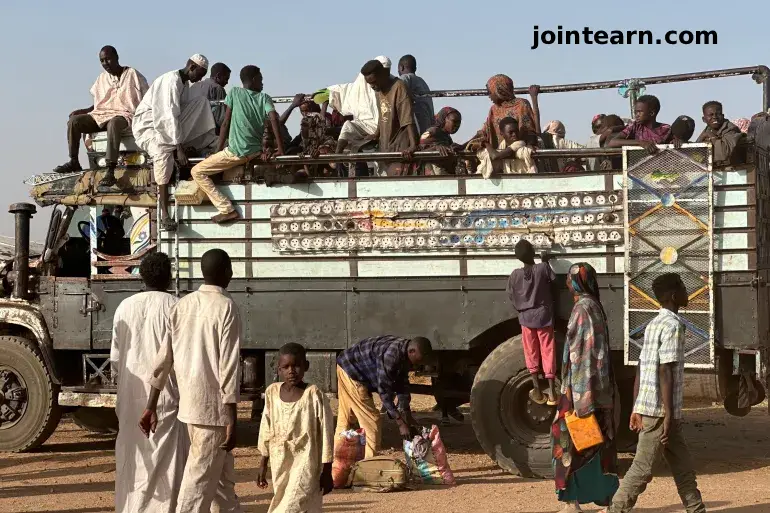
The long-running conflict in Sudan reached a new flashpoint this weekend as the Rapid Support Forces (RSF) announced they had seized a key Sudanese Armed Forces (SAF) base in El-Fasher, North Darfur — the army’s last major stronghold in the region.
Despite the RSF’s claims of victory, analysts and local sources suggest that the battle for El-Fasher is far from over. The besieged city, home to more than 250,000 civilians, remains a humanitarian catastrophe, with widespread starvation, mass displacement, and continuing clashes between the warring sides.
RSF Claims Control of Strategic Military Base
In a statement released Sunday, an RSF spokesperson declared that its fighters had “liberated the 6th Division in El-Fasher”, calling it a decisive moment in the group’s campaign against the Sudanese army.
“We have broken the back of the army and its allies by taking full control of this strategic military base,” the spokesperson said, hailing it as “a step on the path to building a new Sudan founded on freedom, peace, and justice.”
A video circulated on RSF channels showed soldiers celebrating in front of the base’s sign for the Sixth Infantry Division, although Reuters verified only the location — not the timing — of the footage.
According to Al Jazeera correspondent Hiba Morgan, the RSF’s apparent capture came after “days of heavy fighting” around the city. However, Morgan noted that SAF troops had already withdrawn and “rebased themselves around El-Fasher,” suggesting that RSF control remains limited to the military compound rather than the entire city.
Eighteen-Month Siege Pushes Civilians to the Brink
For nearly 18 months, El-Fasher has been under siege by the RSF, which has bombarded civilian areas with drone and artillery strikes. The blockade has choked off vital supplies, creating catastrophic conditions for civilians trapped inside.
Humanitarian organizations report that food shortages, lack of medical care, and mass starvation are now widespread. The United Nations estimates that over 12 million Sudanese have been displaced since the conflict erupted in April 2023, while 30 million people are in need of emergency aid — making Sudan the world’s largest humanitarian crisis.
The UN Children’s Fund (UNICEF) and World Food Programme (WFP) warned this week that thousands of children in El-Fasher face imminent death without urgent access to food and healthcare.
War Crimes Allegations and Ethnic Violence Fears
The UN Human Rights Council’s mission to Sudan reported last month that both sides — the RSF and SAF — have committed grave abuses, including crimes against humanity.
Human rights groups warn that an RSF takeover of El-Fasher could lead to ethnic cleansing, echoing atrocities that occurred when the paramilitary seized the Zamzam camp south of the city earlier this year. Survivors described killings, sexual violence, and looting committed by RSF fighters.
Although the RSF has claimed to be allowing civilians and surrendered soldiers to leave El-Fasher safely, eyewitnesses say the escape routes are perilous. Refugees report being robbed, assaulted, and even killed by armed men during their journey toward Tawila and other displacement camps.
Strategic Stakes: Control of Darfur and Sudan’s Future
If confirmed, the RSF’s capture of El-Fasher’s military base would represent not just a battlefield success, but also a major political and territorial gain. It would allow the group to consolidate its dominance over Darfur, a vast and resource-rich region where it has already established a parallel government.
Control of El-Fasher could effectively split Sudan in two, deepening fears that the conflict is moving toward state fragmentation — with the RSF ruling western Sudan and the SAF entrenched in the east and center.
Military analysts say that even with the base captured, urban combat and guerrilla warfare are likely to continue inside the city, as the Sudanese army maintains defensive positions around El-Fasher’s outskirts.
RSF Drone Attacks Expand Beyond Darfur
The RSF has intensified its use of armed drones, extending the conflict beyond Darfur and into other key regions. On Tuesday, RSF strikes targeted power infrastructure, knocking out electricity in several cities and injuring six workers.
Meanwhile, Khartoum International Airport — which the army had planned to reopen after retaking the capital in March — was attacked for a fourth straight day on Friday, forcing authorities to delay its reopening once again.
UN expert Radhouane Nouicer has expressed alarm over the rising use of drone warfare by both factions, warning that the indiscriminate nature of such attacks poses a grave risk to civilian populations.
International Response and Diplomatic Paralysis
The international community has struggled to mediate an end to the conflict. Despite repeated promises, US President Donald Trump has yet to launch a concrete peace initiative for Sudan, focusing instead on Middle East diplomacy and trade negotiations.
Aid agencies and analysts have criticized Washington and other global powers for failing to prioritize Sudan, even as the conflict threatens to destabilize the entire Horn of Africa.
“Sudan has become the world’s forgotten war,” said a humanitarian coordinator based in Nairobi. “Without stronger international intervention, millions more lives will be lost.”
Outlook: A City Under Fire and a Nation on the Edge
As the battle for El-Fasher rages on, Sudan stands at a crossroads. The city’s fall would mark a major turning point in a war that has already killed tens of thousands and left the nation’s infrastructure in ruins.
For now, both sides appear determined to fight to the end — with civilians trapped in the middle of a humanitarian nightmare that shows no sign of ending.


Leave a Reply